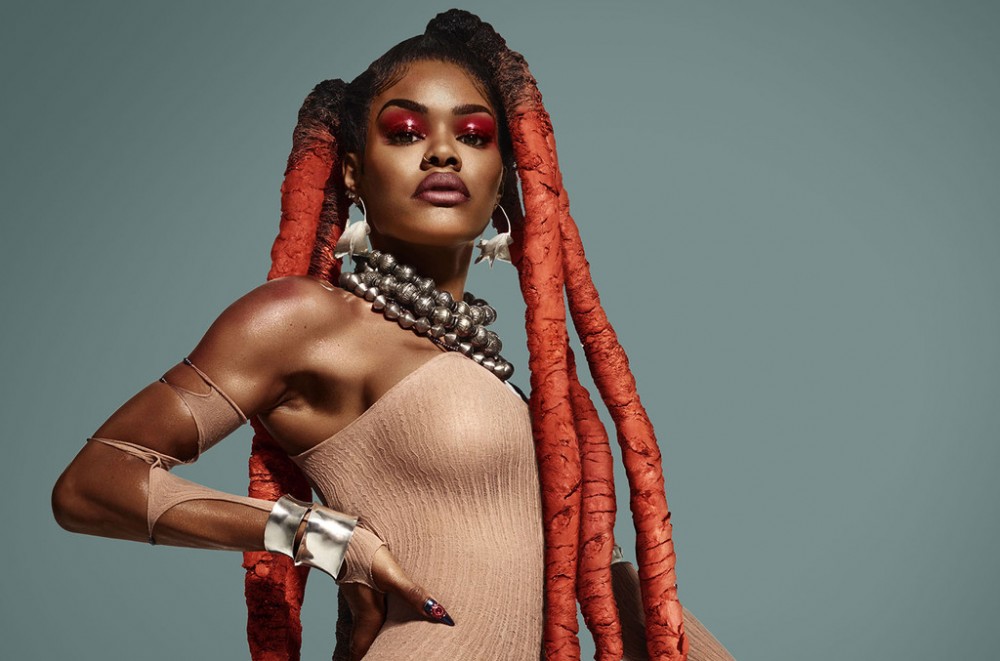
As many Blacks continue to fight for racial equality and justice from police brutality, Friday (June 19) will serve as a day of celebration within the African American community in honor of Juneteenth, a day commemorating when slaves were declared free in the state of Texas following the conclusion of the American Civil War.
For Teyana Taylor, not only will she be rejoicing the liberation of her race, but also the deliverance of her elusive project, The Album. A follow-up to her 2018 mini-opus KTSE, Taylor’s fourth album is a fountain of different emotions: across a 23-track effort, the Def Jam singer looks to galvanize the Black community with her candor, lucid vision and unapologetic love for her race — all while being six months pregnant. Rather than disarm her brazen attitude for change, Taylor stays faithful to her core beliefs and delivers a powerful message amidst dark times.
Ahead of the release of her album, Taylor breaks down the importance of standing united, why she chose to drop her album on Juneteenth, and staying active in the fight for change during her pregnancy.
It’s been an extremely tough time, especially for pregnant women. You’re extra hormonal. You’re extra emotional. So how it’s hitting you, it’s hitting me 10 times more.
It’s all the way falling apart for me, because I’m feeling for our people. And to also be a strong Black woman, and be so enraged, [it’s hard], because I’m also pregnant. I gotta find that balance to being mommy, and being that Black woman like, “OK, cool. Y’all don’t hear us, but y’all gone see us. Y’all gone feel us. We might have to kick down the door, but you gonna know what it is.” So imagine having that mentality and you’re sitting there six months pregnant? That part just makes me cry.
I started to get into meditation very, very heavy since all of this been happening to really just reset myself and pray for my people. Like, I love the fact that I’m using my platform to spread awareness, taking a stand and donating, but I wanna be out there too. [But, again though], I’m carrying, and I also have a daughter who I have to have those tough conversations with and to prepare her. This isn’t a naive conversation, this is preparation, because we are Black.
There’s times where I would be up and I would just watch my husband and my daughter sleep and I’d just cry, because what I’m looking at is not only my family, but past the wealth and fame, I’m looking at a Black child and a Black man first. I could have lost them yesterday, I could lose them today, I could lose them tomorrow and the same thing for me. So that’s where my mindset is for me. It’s a lot for me to take all that in to see what people are going through on social media and outside and be a pregnant Black woman.
I really have been praying for our people, but I definitely been all about that by-any-means-necessary movement. I’m with it. I support it. I’m not condoning [looting], but I’m not upset at it neither. It doesn’t break my heart to see some businesses getting [looted]. That sh-t doesn’t matter because you know what, a lot of those stuff you can get back. We can’t get George [Floyd] back. We can’t get Ahmaud [Arbery] back. We can’t get Breonna [Taylor] back. We can’t get Sandra [Bland] back. The list goes on, on and on about people who we can’t get back.
So I don’t care about no glass windows. I’m sorry, because we’ve been trying to be nice. We’ve been trying to be peaceful and it hasn’t gotten us anywhere. The record “Still” on my album, that’s what it’s about. We’ve been crying for love for a very, very long time. Now, if we gotta kicking down some doors for y’all to finally start moving, we gotta keep that same energy.
It took me maybe a couple of days to record “Still” alone. I just kept the crying in [the studio]. I cried on the record, but I said, “This is me. This is my truth.” Hearing Junie’s voice on “Come Back to Me,” I cried that session. Like honestly, there’s little pieces in each studio room that was difficult for so many reasons and not necessarily bad things, but it just emotionally really spoke to my heart. Now when I hear that album as a whole and we get to the Studio M and it ends with “We Got Love,” that’s where the most joyous tears come from because it’s like, “Damn, I went through every emotion.” That’s what I want the fans to feel. I want them to laugh with me, cry with me, feel kinky with me, and celebrate with me. That’s the emotions that I give off at my concert. That’s what I wanted for the album.
With releasing the album on Juneteenth, it’s important because if you noticed the lead singles that I led with were “Made It” and “We Got Love.” So I’ve always been here. I’ve always been about us being celebrated and celebrating my culture and my people. For everything to happen, from my album getting delayed and it falls perfectly on Juneteenth, yes, it’s a celebration.
We still got work to do, though. It’s still a lot of work to be done, but I just wanted it to be a thing where Juneteenth is amazing, but even after Juneteenth, we have to keep going. We have to keep celebrating one another and not letting that die down. We have to all keep taking a stand, because it shouldn’t be just a thing where we’re celebrated for one day, or a month, and then that’s that.
(As told to Carl Lamarre)


 47
47